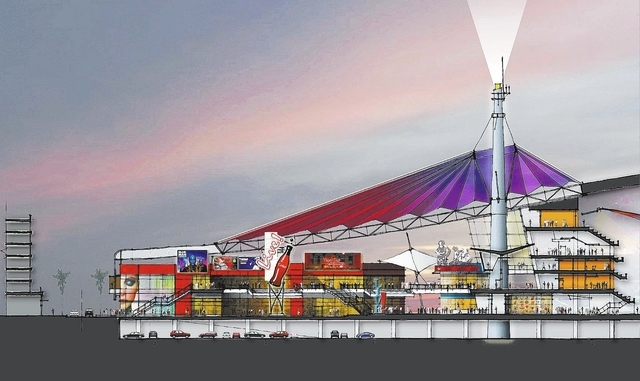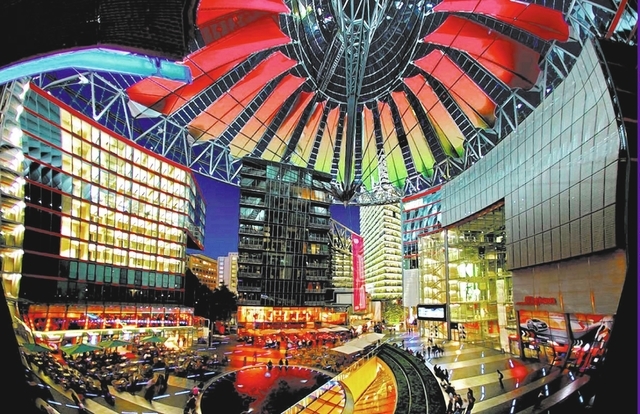Pro-arena faction wins bloody victory in Las Vegas
Drawings of a proposed downtown Las Vegas arena depict a sleek, glass-and-steel structure sparkling in the glare of spotlights and neon.
The would-be developers from the Cordish Companies describe the $390 million facility as a “generational opportunity” that would attract millions of new visitors to the city’s burgeoning downtown and Symphony Park district.
Political supporters of the project savor the prospect of attracting big league basketball and hockey to a pro sports backwater.
Those dreamy scenarios typically rule the day when a showcase project clears a major hurdle, as the arena did Wednesday.
But the 4-3 city council vote to give Cordish another four months - after four years of planning - to finish its funding plan was a bloody victory for the pro-arena faction. It revealed deep divides between the downtown business community and city hall, and between council members who disagree on the propriety of investing public money in a home for a sports franchise.
The debate also laid bare the hard fact that the current financial plan falls $52 million short of the estimated cost, with no obvious way of filling the gap. And given the hard feelings aired during public testimony, it’s hard to imagine major downtown players volunteering to help.
“I can’t help but feeling like a betrayed spouse or partner, not just once but several times,” said Richard Worthington, chief operating officer of the Molasky Group development company and a Downtown Las Vegas Alliance director.
Worthington was upset that Cordish’s original funding plan, revealed just days before the vote, called for a tax on downtown businesses to raise about $50 million for the arena. City officials quickly backed off that scheme once it went public.
But he and others were also upset about previous city attempts to get the state Legislature authorize a $1,000 tax per parking space on downtown businesses for an arena, plus extending and diverting a soon to expire hotel tax that paid for the Fremont Street canopy. The moves failed, but each contributed to tension between the city and downtown business owners.
“The time for this project has come and gone,” Worthington said told the council.
Worthington wasn’t the only prominent downtowner to harshly criticize the city, Cordish and the arena proposal.
Lobbyist Russell Rowe of Boyd Gaming, which owns the Fremont, California and Main Street Station casinos, said in addition to opposing the downtown business tax it opposes using $187 million in city-backed bonds as the major funding source.
“We are frankly shocked at how this has come about,” Rowe said. “If Cordish wants to come here and build an arena downtown we welcome them. But don’t ask the public and the people in this community to fund it when we are trying to figure out how to fund more cops.”
Council members and Mayor Carolyn Goodman were just as testy, showing a clear divide over use of public money. Goodman at one point raised her voice, a rarity for the typically sedate group.
She and her husband, former Mayor Oscar Goodman, have long pushed a downtown arena. She said it would complement other projects they have lent their heavyweight political support, and read out a list that includes the Smith Center for the Performing Arts; the Museum of Organized Crime and Law Enforcement; and the new city hall on Main Street.
“We have been gamblers forever,” she said, “how can we just put our tail between our legs and not go forward?”
Councilman Steve Ross, who voted to keep the Cordish deal, brandished the prospect that the arena would create nearly 15,000 temporary and permanent jobs. He said cutting bait now would leave the city with nothing.
“It is challenging to see some of our tribal leaders of this community here today opposing this,” Ross said. “Should Cordish go away, what happens then? Who is standing in line?”
Those opposed had some sharp rhetoric of their own.
Councilman Bob Coffin suggested how the city might look to Cordish, a self-described “global conglomerate of business” run by a Baltimore-based family.
“We are just out in the country with a little hayseed in our teeth,” Coffin said, noting that the Cordish project has languished for four years.
“Nothing has happened,” Coffin said. “If you want to get jobs, fire this partner and get a new partner.”
Councilman Bob Beers, another ‘no’ vote, said the proposal could leave taxpayers holding the bag.
“If the project fails, taxpayers cover the difference,” Beers said, adding that the city is already paying $500,000 per month in interest on bonds for Symphony Park development. “We just shovel the money in until we can no longer pay our employees.”
When Councilman Ricki Barlow moved to approve the extension, Beers asked the motion reflect that while a majority of the council supports it, at least four of the seven oppose using public money for the project.
Before Barlow could respond, Goodman leaned back from her microphone and said “no.” Barlow declined to make the change.
Cordish and city officials, lead by City Manager Betsy Fretwell, have four months to negotiate the hard feelings and political divides, patch together a funding plan that can win council support as well as backing by potential investors.
It won’t be easy.
Guy Hobbs, an economic consultant who has worked on other major local event venue proposals, said Cordish’s expectation of attracting nearly 140 events annually is overly optimistic, meaning the project would have to balance out with income from far fewer events.
Hobbs said he generally supports an arena but considers it unlikely that Cordish’s “best in class” facility can be built without some public money. That prospect makes political support more difficult, and sets up a busy four months for Fretwell and Cordish.
“You can run the numbers, you can run different scenarios,” Hobbs said of the time frame. “But I think four months, given the experience I had with these things - that would be challenging to have everything buttoned up and everyone shaking hands.”
Contact reporter Benjamin Spillman at bspillman@reviewjournal.com or 702-383-0285. Follow him on Twitter @BenSpillman702.





















